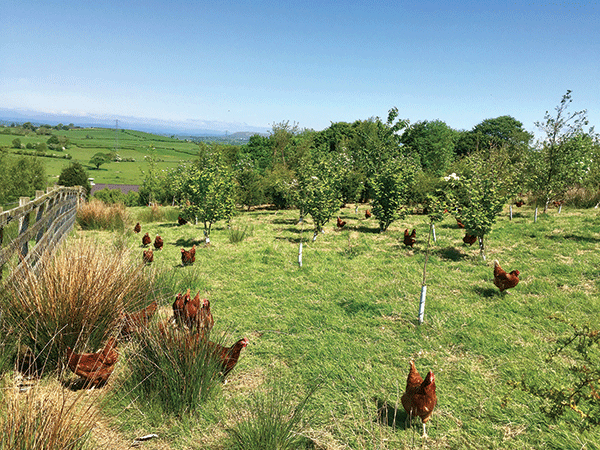It’s easy to plunge into despair when thinking about the many problems inherent in our food system. So it’s reassuring to come across projects like Innovative Farmers, which is helping farmers nationwide to promote ecological practices and reduce costly and harmful inputs.
Set up in 2012 by the Soil Association and part-funded by organic veg box company Riverford, Innovative Farmers is a not-for-profit network that links researchers with farmers to carry out field work on their own farms.
The scheme has set up over 100 ‘field labs’ over the past eight years, with anything from four to 20 farms involved in each project, and coordinated £300,000 worth of grants for farmer-led research.
The benefits of carrying out farmer-led research like this are immense. Because it’s the farmers who decide what is studied, the research directly answers questions to real-life problems that farmers face. All too often agricultural research doesn’t address this.
Secondly, since the research is carried out with commercial and practical issues in mind, it is more likely to be implemented by the farmers long-term. Having worked on the research themselves, farmers are empowered to make evidence-based decisions.
“Farmers must be supported to innovate and adapt to this changing world as they grapple with record-breaking heatwaves, unpredictable weather and the disruption caused by Covid-19,” says senior communication manager at Innovative Farmers, Dan Iles.
As farming can be an isolating business, an initiative that brings farmers together from all sorts of backgrounds, conventional and organic, provides not only invaluable knowledge exchange, but a sense of community and solidarity. “Farmer-led research is critical to reducing reliance on costly and harmful inputs and making our farm systems more resilient to future shocks. To fix our broken food system we must put farmers in the driving seat,” adds Iles.
Music for hens’ ears

Glenn Haggart, a farmer in Lancashire, started to notice the beneficial impacts of playing classical music to his hens. Clearly a high-brow flock!
However, up until now, very little research has been done on its direct effects. Haggart wanted to find out what kind of music is best for his hens and whether relaxation is key for a long and healthy life.
Innovative Farmers has enabled Haggart to equip the sheds with surround sound to get full coverage and have linked him with the University of Bristol to carry out the research.
Haggart has been impressed with the results, saying: “Anyone can walk around the shed and the girls don’t mind at all; they’re not even bothered by drilling, because it helps them get used to a range of noises and partially disguises them. Music and sound can also distract the girls if they begin fighting.”
Compost tea, and brewing a high quality crop

Sophie Alexander, an arable farmer in Dorset, began to observe with some interest the effects of a compost brewing machine. With a farm of 1,000 acres, it is just not feasible to apply normal compost to her crops in the amount it would require.
But using a compost ‘brewer’ oxygenates regular compost, which increases the potency by creating an exponential growth of the beneficial microbes. One brew of the newly potent compost can make enough to apply to 100 acres. Where the compost tea was applied, the crop was of a higher quality and meant Alexander was able to sell the crop for milling grains, at a higher cost than the commodity market.
“The scientific rigor that Innovative Farmers bring to trials and the network is vital,” she explains. “It has also helped tremendously with financing and it’s made it possible to do something that I wanted to investigate.”
Hot water seed treatment

Not only does foliar disease (such as powdery mildew and leaf rust), on Devon-based Riverford’s chard reduce the overall yield, it also takes much longer to pick, and because the picking is done by hand, labour costs increase significantly. At times, this can leave the crop barely commercially viable.
Innovative Farmers established a field lab on Riverford’s Wash Farm in south Devon to investigate a hot water seed treatment to eradicate disease pathogens before planting. Instead of using chemicals to treat the seed for disease, the field lab trialled immersing the seed in hot water before sowing to reduce foliar disease, with great success. As Alex Stephens, crop production manager at Riverford, says: “The treatment virtually eliminated the disease within the chard.”
Investigating antibiotic usage in dairy
Mastitis, or inflammation of the udder tissue, is the most common cause for antibiotic use in the dairy industry. A group of ten dairies have been working with Innovative Farmers and the Royal Veterinary College to reduce their use of antibiotics in mastitis cases through increased testing. Project researcher Peter Plate says: “Mild and moderate cases of mastitis have a very high spontaneous cure rate (cure by themselves with no treatment). So, antibiotics in these don’t make a big difference.”
The team developed an on-farm testing system that identifies in 14 hours which cases require antibiotics and which ones don’t. Not only will farmers spend less money on antibiotics, it reduces the time that the cow would normally spend out of milk production while recovering.
Where the real field work happens
It’s projects like these, which share techniques often used by organic farmers to replace chemical or other inputs with the non-organic industry, that could be vital in scaling up sustainable farming across the UK. And while food and farming policies are so often decided in London offices, here, at least, it’s in the fields where the real field work is taking place.
This article was initially published in the latest print issue of Wicked Leeks. You can read the full magazine online and for free via Issuu.









0 Comments